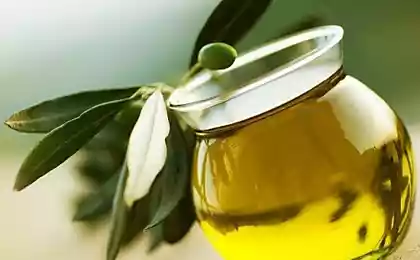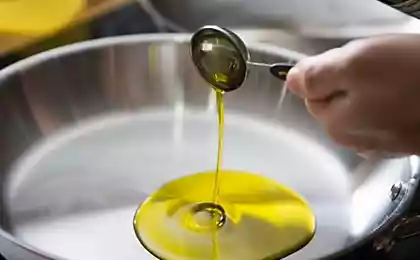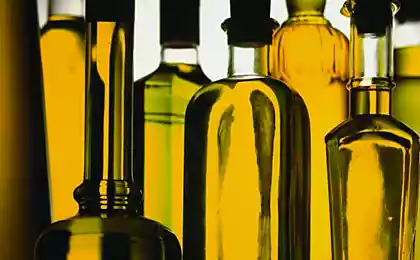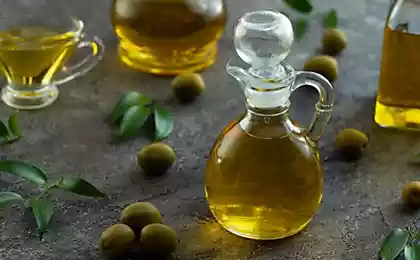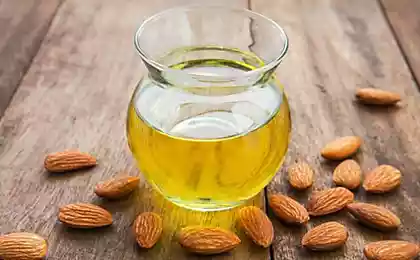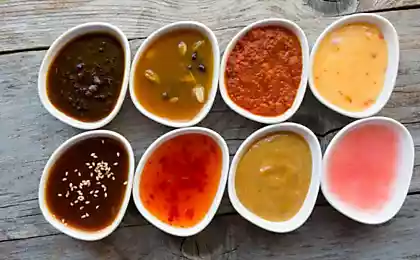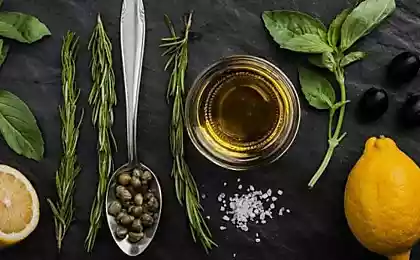486
Find out the truth! How actually useful the olive oil?
As there was strong belief that it is very useful, it is now difficult to say.
Can be guilty of the much-vaunted Mediterranean diet, where everything in olive oil? Or aggressive marketing? Understand what to believe and what not.
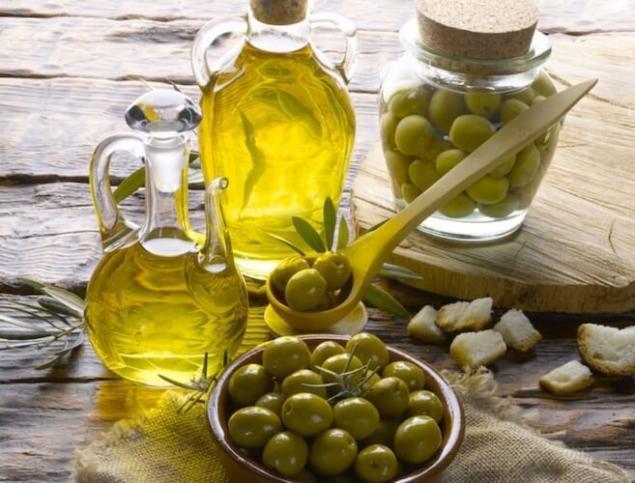
Olive oil can not be fried
This is one of the most common myths, walking on the Internet. Meanwhile, olive oil is not only safe, but recommended by scientists and nutritionists for high temperature frying.
Moreover, it can be used more than once.
Dr. Mary Enig, author of Know your Fats, know about the fats and more. She recommends the following: "For roasting and stewing it is best to use a unique blend of oils, which one-third consists of coconut oil, one part sesame and part of the same olive".
Olive oil is definitely a good oil. But there are many other vegetable oils, no less healing, and by the way, cheaper. Internet portal demonstrated Medical benefits of certain oils in cooking and what foods they are best used.
Just remember: any vegetable oil are fats in pure form, with high calorific value. So if you are trying to lose weight, it is not necessary to generously pour all dishes. Two tablespoons a day is enough.
Olive oil is the best source of polyunsaturated fatty acids omega-3 and omega-6 speaking of health benefits, the richest source of omega-3 acids, essential for heart health, is linseed oil. Oil of wheat germ is a champion of the omega — 6 acid, which promotes skin renewal and hair growth, strengthens bones, normalizes metabolism and has beneficial effects on reproductive function. Therefore it is not necessary to restrict the diet of olive and sunflower oil. If you believe Medical, in the kitchen, the hostess should be 14 varieties of vegetable oils.
Olive oil — a leader in content of vitamin E In the usual sunflower oil with vitamin E is even more than in olive. In any carrier oil contains vitamins a, E, D and K. However, their number depends on the production technology. Therefore, sunflower oil may contain more beneficial components than a cheap version of the olive.
If the oil "freezes" — is an indicator of the quality You might find in the fridge the olive oil quickly thickens. Someone thinks that in this way you can test buying on the presence of impurities. This opinion is not entirely true.
According to Erin of Mesquite prorodeo and resistol arena, Executive Vice-President of the North American Association of olive oil quality depends on many factors.
A cooled oil become more thick consistency. This is not an exclusive feature olive oil extra-virgin. The quality depends on the mixture of fatty acids — saturated and unsaturated fats, as well as from the olives — their varieties, dates of harvest and other factors.
On the other hand, if at low temperatures, the oil retains consistency, it is worth considering not if you bought a fake. By the way, keep olive oil at any temperature up to 35 °C. its properties is not affected.
Labeling extra-virgin is the highest grade ideally, to earn the appropriate label, the oil must undergo a formal laboratory test for the presence of certain chemicals. In addition, the group of tasters, recognized by the International olive oil Council, to assess the organoleptic properties of the product, that is, to confirm the purity and freshness of taste. Extra-virgin is produced without the use of any chemicals and heat processing, therefore all the healing properties of the oil are preserved.
However, skeptics claim that this marking has long lost its true meaning and is used as a marketing ploy. So, let's see what all kinds of labels. With extra virgin olive oil have already figured out.
Virgin olive oil the second cold pressing. It is believed that in quality it is inferior to the first extraction. In practice, and to the other the bottle you can detect one and the same product.
Olive oil, Pure olive oil, Pomace oil — oil chemical extraction obtained from "otzhimok" with the use of chemical solvents. Most often they go to the production of mayonnaise and sauces.
Unlike extra virgin of the above names do not contain antioxidants and phenols which have medicinal properties. It would seem that to buy "pure" does not make sense. However, it was his "purity" to avoid smoke and choking odor when heated.
Today large retailers started to produce olive oil under their own brands. Our law does not meet European and allows some liberties in this category of products. Therefore it is not always written on the label matches the contents of the bottle.
"Titled" oil is the best If markings do not guarantee the quality of the contents of the bottle, what to speak of the numerous medals, emblazoned on the label. The only authoritative competition of olive oil is considered the "Mario Solinas", which is held in Spain.
Marked there product is exceptional on all counts. The truth is many. Kudos to the rest of the contests among gourmets under the big question.
"Mysterious" abbreviation — a guarantee of quality But it's true. Abbreviations DOP/IGP/PDO indicate the geographical area of production. And mark Diavolocane indicates that the oil is "biologically pure", that is, it is a kind of protection against forgery. On bottles of domestic origin, such label will not meet. But there is another important point, which focuses Marina Makisha: "I would advise you to pay attention to the production date and shelf life. Because, unlike wine than oil "younger", so it is tastier and healthier. Since filling the oil should contain not more than 18 months. I would not recommend to buy it on sales, where generally trying to sell unsold merchandise. Although due care has a chance to buy quite a good product."
Misconceptions about certain foods and their components affect not only their benefit but also harm. For example, monosodium glutamate — abuse, and in fact it is relatively harmless. published
P. S. And remember, only by changing their consumption — together we change the world! ©
Source: /users/1077
Can be guilty of the much-vaunted Mediterranean diet, where everything in olive oil? Or aggressive marketing? Understand what to believe and what not.

Olive oil can not be fried
This is one of the most common myths, walking on the Internet. Meanwhile, olive oil is not only safe, but recommended by scientists and nutritionists for high temperature frying.
Moreover, it can be used more than once.
Dr. Mary Enig, author of Know your Fats, know about the fats and more. She recommends the following: "For roasting and stewing it is best to use a unique blend of oils, which one-third consists of coconut oil, one part sesame and part of the same olive".
Olive oil is definitely a good oil. But there are many other vegetable oils, no less healing, and by the way, cheaper. Internet portal demonstrated Medical benefits of certain oils in cooking and what foods they are best used.
Just remember: any vegetable oil are fats in pure form, with high calorific value. So if you are trying to lose weight, it is not necessary to generously pour all dishes. Two tablespoons a day is enough.
Olive oil is the best source of polyunsaturated fatty acids omega-3 and omega-6 speaking of health benefits, the richest source of omega-3 acids, essential for heart health, is linseed oil. Oil of wheat germ is a champion of the omega — 6 acid, which promotes skin renewal and hair growth, strengthens bones, normalizes metabolism and has beneficial effects on reproductive function. Therefore it is not necessary to restrict the diet of olive and sunflower oil. If you believe Medical, in the kitchen, the hostess should be 14 varieties of vegetable oils.
Olive oil — a leader in content of vitamin E In the usual sunflower oil with vitamin E is even more than in olive. In any carrier oil contains vitamins a, E, D and K. However, their number depends on the production technology. Therefore, sunflower oil may contain more beneficial components than a cheap version of the olive.
If the oil "freezes" — is an indicator of the quality You might find in the fridge the olive oil quickly thickens. Someone thinks that in this way you can test buying on the presence of impurities. This opinion is not entirely true.
According to Erin of Mesquite prorodeo and resistol arena, Executive Vice-President of the North American Association of olive oil quality depends on many factors.
A cooled oil become more thick consistency. This is not an exclusive feature olive oil extra-virgin. The quality depends on the mixture of fatty acids — saturated and unsaturated fats, as well as from the olives — their varieties, dates of harvest and other factors.
On the other hand, if at low temperatures, the oil retains consistency, it is worth considering not if you bought a fake. By the way, keep olive oil at any temperature up to 35 °C. its properties is not affected.
Labeling extra-virgin is the highest grade ideally, to earn the appropriate label, the oil must undergo a formal laboratory test for the presence of certain chemicals. In addition, the group of tasters, recognized by the International olive oil Council, to assess the organoleptic properties of the product, that is, to confirm the purity and freshness of taste. Extra-virgin is produced without the use of any chemicals and heat processing, therefore all the healing properties of the oil are preserved.
However, skeptics claim that this marking has long lost its true meaning and is used as a marketing ploy. So, let's see what all kinds of labels. With extra virgin olive oil have already figured out.
Virgin olive oil the second cold pressing. It is believed that in quality it is inferior to the first extraction. In practice, and to the other the bottle you can detect one and the same product.
Olive oil, Pure olive oil, Pomace oil — oil chemical extraction obtained from "otzhimok" with the use of chemical solvents. Most often they go to the production of mayonnaise and sauces.
Unlike extra virgin of the above names do not contain antioxidants and phenols which have medicinal properties. It would seem that to buy "pure" does not make sense. However, it was his "purity" to avoid smoke and choking odor when heated.
Today large retailers started to produce olive oil under their own brands. Our law does not meet European and allows some liberties in this category of products. Therefore it is not always written on the label matches the contents of the bottle.
"Titled" oil is the best If markings do not guarantee the quality of the contents of the bottle, what to speak of the numerous medals, emblazoned on the label. The only authoritative competition of olive oil is considered the "Mario Solinas", which is held in Spain.
Marked there product is exceptional on all counts. The truth is many. Kudos to the rest of the contests among gourmets under the big question.
"Mysterious" abbreviation — a guarantee of quality But it's true. Abbreviations DOP/IGP/PDO indicate the geographical area of production. And mark Diavolocane indicates that the oil is "biologically pure", that is, it is a kind of protection against forgery. On bottles of domestic origin, such label will not meet. But there is another important point, which focuses Marina Makisha: "I would advise you to pay attention to the production date and shelf life. Because, unlike wine than oil "younger", so it is tastier and healthier. Since filling the oil should contain not more than 18 months. I would not recommend to buy it on sales, where generally trying to sell unsold merchandise. Although due care has a chance to buy quite a good product."
Misconceptions about certain foods and their components affect not only their benefit but also harm. For example, monosodium glutamate — abuse, and in fact it is relatively harmless. published
P. S. And remember, only by changing their consumption — together we change the world! ©
Source: /users/1077
Just one breathing exercise will get rid of the belly!
5 rules for the collection and storage of seeds
